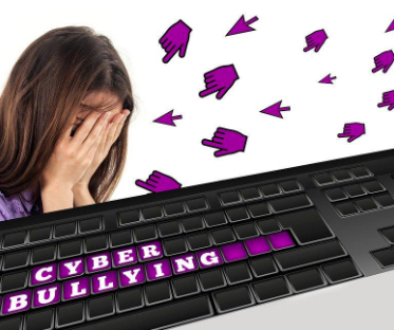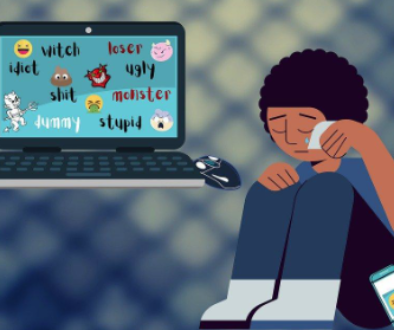How to Help Kids Deal with Cyberbullying

In the age of mobile phones and digital devices, cyberbullying or online abuse is growing each year. In most cases, young children and teenagers are the targets of cyberbullying. 95% of teenage children are connected to the Internet through personal devices. What’s alarming is that 60% of teenagers have experienced cyberbullying in their life – while only 1 in 10 victims have reported their abuse to their parents.
As a parent, how can you know if your child has been cyberbullied? This is not simple, but you can watch out for physical symptoms like your child not eating or sleeping properly. Additionally, they may be looking for ways to skip school or wake up late for school.
Parents can help their child deal with cyberbullying. Let’s discuss how in this article.
How to help your child deal with cyberbullying
Due to their sense of shame or embarrassment, most children do not talk to their parents about their experiences. They also fear retribution from their parents, thus complicating the experience even more.
Here are 10 ways to help your child deal with cyberbullying:
- Offer complete support to your child.
Parental support is the best remedy for a young child going through the effects of cyberbullying. Speak to your child and assure them that it’s not their fault if they are being bullied. Reassure your child of your continued love and support. Remind them that this is just temporary – and that they will emerge stronger from this experience.
- Advise them to take precautionary measures.
Precautionary measures are necessary so that your child does not have to go through this experience again. Suggest they take a few days’ breaks from their mobile phone or social media networks. If they don’t want to take a break, advise them to immediately block the cyberbully (if known) from their mobile phones and online platforms.
Additional measures can include installing parental control on your child’s mobile apps – so that you are notified of any messages that they receive.
- Educate them about cyberbullying.
In some cases, you may suspect that your child has been cyberbullied but are not sure. In that case, assure them that they can talk to you about their experiences and feelings at any time. Educate them about physical bullying and cyberbullying – and ask if they have experienced anything like this at school or on online platforms.
- Respond to the cyberbully appropriately.
In cases where the identity of the bully is known, it’s natural for parents to respond to them with anger or hurt. Don’t confront the cyberbully by calling law enforcement officials or facing their parents with aggressive behavior.
If the incident has happened on your child’s school premises, report this matter to their teacher or school authorities. Find out if they have any policies to deal with cyberbullying. Show them ample evidence in the form of screenshots of the posted messages or comments.
- Don’t ignore cyberbullying or take it lightly.
Cyberbullying can occur in many forms – but it always has adverse effects on your child. No matter how small the incident, do not ignore cyberbullying or take it lightly. Victimized children have little escape from their bullies – and can only hide if they disconnect themselves completely from the Internet. This can lead to a feeling of isolation and hamper their social development skills.
Kids with mental health problems are particularly vulnerable to cyberbullying. Speak to them regularly about what is happening in their online world.
- Teach your child how to deal with cyberbullying.
As a parent, you can teach your child how to deal with cyberbullying if it happens in the future. Here are some practical tips that you can suggest to your child:
- Allow them to continue using their mobile phones and browse the Internet.
- Teach them about the importance of blocking people who post hateful or negative messages on online platforms.
- Train them to report any incidents of cyberbullying that they witness on any online platform.
- Take positive actions like reporting a bully, flagging a negative comment, or not forwarding a shameful photo or video.
- Report cyberbullying to external authorities.
If you are deeply concerned about cyberbullying, you can take positive steps to control the prevalence of online abuse. Here are a few of those actions:
- Raise your concern on social media platforms like Facebook or Instagram – or provide suggestions to other cyberbullied users on these platforms.
- Learn how to report online bullies or protect your child’s identity on popular websites and apps that your child may be using regularly.
- If cyberbullying is happening through text messages, report it to your mobile phone operator and block the number of the cyberbully.
- Be aware of what’s happening in your child’s life.
Finally, parents must keep a tab on what’s happening in their child’s life (including their online world). Learn about their friends in both the online and offline worlds. Be familiar with the digital platforms that they use the most. Teach them the value of “disconnecting” from the Internet regularly – and exploring the physical world. If possible, encourage them to limit the use of the Internet (for example, before sleeping or during holidays).
Conclusion
Unfortunately, we live in a world where online bullying is growing more common. However, concerned parents can take constructive action to help their kids deal with cyberbullying. As a parent, you can mold yourself to become your child’s best friend whenever they are facing any emotional stress.
Besides helping them cope with the difficult experience, you can talk about the positive role they can take to make a safer world. This includes reporting any cyberbullying incident that they may witness to the higher authorities.



